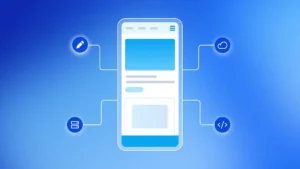As technology accelerates toward 2025, full-stack development 2025 demands a versatile and evolving skill set that goes beyond traditional frontend and backend coding. Today’s developers must master cutting-edge software engineering skills spanning modern JavaScript frameworks, scalable backend architectures, cloud-native applications, and increasingly, AI integration. The convergence of these domains makes continuous learning essential for developer career growth and relevance. This article explores the critical skills, emerging tools, and strategic tactics every full-stack engineer must master to thrive in 2025, highlighting how Amquest Education’s specialized course empowers engineers with hands-on, AI-led learning and industry-aligned expertise.
Background: The Evolution of Full-Stack Development
Full-stack development has transformed dramatically from the early days of combining HTML, CSS, and a backend language. Today, it encompasses a sophisticated blend of frontend frameworks like React and Vue.js, backend platforms such as Node.js and Python, and cloud services from AWS, Azure, or Google Cloud. The rise of agentic AI and generative AI technologies has further expanded the developer’s toolkit. Integrating AI models for automation, predictive analytics, and personalized user experiences is no longer optional but increasingly expected. As a result, full-stack developers must continuously update their skills to stay competitive in the fast-evolving tech landscape.
Latest Features, Tools, and Trends in Full-Stack Development 2025
Frontend Development
- JavaScript Frameworks: React remains the dominant choice for its robust component-based architecture and vibrant ecosystem. Alternatives like Vue.js and Svelte are gaining traction for lightweight, specialized applications.
- Cross-Browser Compatibility: Ensuring consistent user experience across browsers and devices is critical.
- UI/UX Fundamentals: Modern developers need a solid grasp of design principles, accessibility, and responsive layouts using CSS Grid and Flexbox.
Backend Development
- Server-Side Languages: Node.js, Python, and Java continue as popular choices for building scalable backend services.
- Databases: Proficiency in both SQL databases (MySQL, PostgreSQL) and NoSQL options like MongoDB enables flexible and efficient data management.
- API Development: RESTful and GraphQL APIs are foundational for seamless communication between frontend and backend systems.
- ORM Tools: Libraries such as Prisma (Node.js) and SQLAlchemy (Python) simplify database interactions and improve developer productivity.
DevOps and Cloud
- Version Control: Mastery of Git and platforms like GitHub or GitLab is essential for collaborative development.
- CI/CD Pipelines: Tools like Jenkins, GitHub Actions, and CircleCI automate testing and deployment, accelerating release cycles.
- Containerization: Docker ensures consistent environments, while Kubernetes enables efficient container orchestration and scaling.
- Cloud Platforms: AWS, Azure, and Google Cloud provide the infrastructure for deploying resilient, scalable applications.
AI Integration
- Agentic AI and Generative AI: Embedding AI models into applications enhances automation, analytics, and user personalization.
- AI-Powered Learning: Developers increasingly leverage AI-driven tools to optimize coding, debugging, and testing workflows.
Advanced Tactics for Success
- Security Best Practices: Adopting secure coding techniques, understanding OWASP Top 10 vulnerabilities, and designing secure APIs protect applications and user data.
- Performance Optimization: Techniques like caching, load balancing, asynchronous programming, and code profiling improve responsiveness and scalability.
- Microservices Architecture: Building applications as modular services improves maintainability, scalability, and deployment agility.
- Cloud-Native Development: Embracing serverless computing and container orchestration (e.g., Kubernetes) optimizes resource use and operational efficiency.
- Testing Automation: Writing unit, integration, and end-to-end tests ensures code quality and reliability.
- Soft Skills and Agile Practices: Effective communication, teamwork, and agile methodologies complement technical skills and accelerate project success.
The Power of Content, Storytelling, and Community
Building a strong developer portfolio with real projects, blogging about challenges and solutions, and contributing to open-source communities enhance your visibility and professional network. Sharing knowledge through tutorials, webinars, or meetups builds a personal brand that attracts employers and collaborators alike.
Measuring Success: Analytics and Insights
Using tools like Google Analytics, New Relic, and Datadog helps developers monitor application performance and user behavior, enabling continuous, data-driven improvements. Tracking CI/CD metrics such as deployment frequency and failure rates reflects development efficiency and operational health.
Business Case Study: Netflix’s Transition to Full-Stack and Cloud-Native Architecture
Netflix’s shift from a monolithic system to a microservices-based, cloud-native platform exemplifies the power of mastering full-stack development 2025 skills. Leveraging React for frontend, Node.js for backend, AWS for cloud infrastructure, and DevOps automation, Netflix achieves rapid feature deployment, scalable infrastructure, and resilient service delivery. This transformation highlights the competitive advantage gained by engineers proficient in modern full-stack and cloud technologies.
Actionable Tips for Developers
- Build and Maintain a Portfolio: Showcase projects utilizing React, Node.js, and cloud deployment.
- Master Git and CI/CD: Automate your development workflow for faster, reliable releases.
- Learn Cloud Fundamentals: Experiment with AWS free tier or Azure sandbox environments.
- Explore AI Integration: Start with accessible AI APIs like OpenAI or Google AI.
- Engage with Developer Communities: Join forums, contribute to open-source, and attend webinars to expand your network and skills.
Why Choose Amquest Education for Full-Stack Development 2025?
Amquest Education’s course in Software Engineering, Agentic AI, and Generative AI offers an AI-led, hands-on learning experience tailored to equip engineers with future-ready skills. Based in Mumbai with national online availability, Amquest partners with industry leaders to provide internships and placement opportunities that bridge theory and real-world practice. The faculty comprises seasoned industry experts who bring practical insights into every module—from modern web architecture and AI integration to DevOps best practices. This unique curriculum ensures graduates are not just coders but innovators prepared to lead in the evolving tech landscape.
Conclusion
Mastering full-stack development 2025 requires a comprehensive skill set that blends frontend expertise, backend robustness, DevOps fluency, and AI integration. The fast-paced evolution of technology demands continuous learning and adaptability. Amquest Education stands out as the premier choice to gain these advanced skills through an expert-led, industry-aligned curriculum. Begin your journey today to future-proof your developer career. Explore the course now
FAQs
Q1: What are the essential software engineering skills for full-stack development in 2025?
A1: Key skills include proficiency in JavaScript frameworks like React and Node.js, backend languages, API development, cloud platforms (AWS, Azure), DevOps tools such as Git and CI/CD pipelines, and AI integration techniques.
Q2: How are web development trends shaping full-stack roles?
A2: Trends like cloud-native applications, containerization (Docker, Kubernetes), microservices, and AI-powered automation are expanding full-stack roles beyond coding to include deployment, monitoring, and AI model integration.
Q3: What programming skills should a full-stack developer focus on?
A3: Strong command over frontend languages (JavaScript, HTML, CSS), backend languages (Node.js, Python, Java), databases (SQL and NoSQL), and frameworks like React and Express are fundamental.
Q4: How does DevOps knowledge benefit full-stack developers?
A4: DevOps skills enable developers to streamline deployment, automate testing, manage cloud infrastructure, and ensure faster, reliable releases, making them more self-sufficient and valuable.
Q5: What career growth opportunities exist for full-stack developers in 2025?
A5: Career paths include AI integration specialists, cloud architects, DevOps engineers, and lead software engineers, supported by continuous skill upgrades and industry demand.
Q6: Why is Amquest Education’s course ideal for aspiring full-stack developers?
A6: Amquest offers AI-led modules, real-world projects, internships with industry partners, expert faculty, and flexible learning options from Mumbai to nationwide, uniquely blending software engineering with agentic and generative AI training[Amquest course page].







